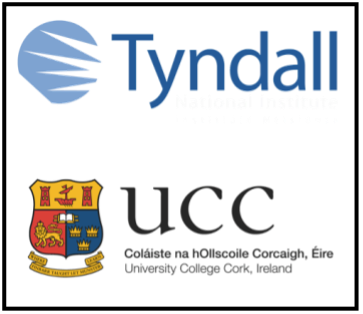Tyndall-UCC (Tyndall), Ireland
The department of Tyndall National Institute (Tyndall-UCC), University College Cork, National University of Ireland, Cork was created in 2004 at the initiative of the Department of Enterprise Trade and Employment and University College Cork to bring together complementary activities in photonics, electronics and networking research at the National Microelectronics Research Centre (NMRC), several UCC academic departments and Cork Institute of Technology (CIT). The strengths of Tyndall National Institute at the present time lie in the area of photonics, electronics, materials, and nanotechnologies, as well as their applications for life sciences, communications, power electronics and other industries. Research programmes range from theoretical modelling and design to novel materials; nanotechnology; device processing and fabrication; packaging and integration; and novel systems incorporating these new devices.
Laboratory resources:
Tyndall-UCC has fully equipped III-V and CMOS clean room facilities that include an e-beam lithography equipment (worth together around 40 million Euros) and have optical (MicroRaman, FTIR, Spectroscopic Ellipsometry) and microstructural (HR TEM, HR SEM and XRD) characterisation facilities. Tyndall has a dedicated laboratory for electrical characterisation of materials and devices completed in 2009. Two Cascade Summit series probe station are available for on-wafer probing of device structures. One probe station is configured for RF measurements (Cascade Infinity Probes). An Agilent E8361C PNA Network Analyzer, 10 MHz to 67 GHz is available for characterization of high frequency device performance. A cryogenic probe station incorporating a liquid helium flow cryostat system and four independent probe manipulators allows dielevel probing and electrical characterisation of devices at temperatures from 400 K (127°C) to 4.2 K (-269 °C)
with temperature control of < 0.1 K.

